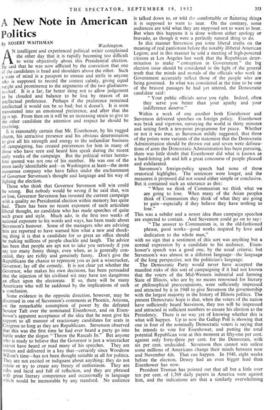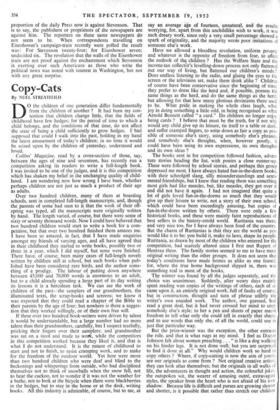A New Note in American Politics
By ROBERT WAITHMAN Washington.
N intelligent and experienced political writer complained the other day that it is rapidly becoming too difficult to write objectively about this Presidential election. He said that he was now afflicted by the conviction that one of the candidates is head and shoulders above the other. Such a state of mind is a passport to unease and strife in anyone who is supposed to record the contest calmly, giving equal weight and prominence to the arguments of the two gladiators- in-chief. It is a far, far better thing not to allow judgement to be clouded and balance to be lost by reason of an intellectual preference. Perhaps if the preference remained intellectual it would not be so bad; but it doesn't.. It is soon transmuted into an emotional preference, and after that the jig is up. From then on it will be an increasing strain to give to the other candidate the attention and respect he should be receiving.
It is reasonably certain that Mr. Eisenhower, by his rugged charm, his attractive presence and his obvious determination to give all his strength and energy to the unfamiliar business of campaigning, has created preferences for him in many of those who have seen and heard him speak during the recent early weeks of the campaign. But the political writer hereto- fore quoted was not one of his number. He was one of the more easily identifiable and—in Washington at least—the more numerous company who have fallen under the enchantment of Governor Stevenson's thought and language and his way of fighting the election. Those who think that Governor Stevenson will win could be wrong. But nobody would be wrong if he said that, win or lose, Governor Stevenson has invested the current campaign with a quality no Presidential election within memory has quite had. There has been no recent exponent of such articulate liberal thought, no candidate who has made speeches of quite such grace and style. Much ado, in the first two weeks of national exposure to his words and ways, has been made about Stevenson's humour. Some of the managers who are advising him are reported to have warned him what a new and shock- ing thing it is that a candidate for so great an office should be making millions of people chuckle and laugh. The advice has been that people are apt not to take you seriously if you say too. many funny things, even when, as is generally con- ceded, they are richly and genuinely funny. Don't give the Republicans the chance to represent you as just a wisecracker, Governor; lay off the comedy. It is not clear yet whether the Governor, who makes his own decisions, has been persuaded that the injection of his civilised wit may have too dangerous an effect upon the electorate. If so, there will be many Americans who will be saddened by the implications of such a conclusion.
Some evidence in the opposite direction, however, may be discerned in one of Stevenson's comments at Phoenix, Arizona, on the remarkable assumption of power by the defeated Senator Taft over the nominated Eisenhower, and on Eisen- hower's apparent acceptance of the idea that he must give his support to all manner of reactionary candidates for seats in Congress so long as they are Republicans. Stevenson observed that this was the first time he had ever heard a party go into battle under the slogan " Throw the Rascals In." But anyone who is ready to believe that the Governor is just a wisecracker cannot have heard or read many of his speeches. They are written and delivered in a key that—certainly since Woodrow Wilson's time—has not been thought suitable at all for politics. They are not excited or indignant about anything; they do not create or try to create any frenzy of enthusiasm. They are calm and lucid and full of reflection, and they are phrased with great literary competence and occasionally in language which would be memorable by any standard. No audience is talked down to, or told the comfortable or flattering things it is supposed to want to hear. On the contrary, some audiences are told what they are supposed not to want to hear. But when this happens it is done without either apology or bravado, as though it were a perfectly natural thing to do.
In this manner Stevenson put some liberal truths on the meaning of real patriotism before the notably illiberal American Legion; and in this manner he told a meeting of high-powered citizens at Los Angeles last week that the Republican deter- mination to make " corruption in Government " the big election issue should be considered in the light of the general truth that the minds and morals of the officials who work in Government accurately reflect those of the people who are being governed. In what was considered at the time to be one of the bravest passages he had yet uttered, the Democratic candidate said: " Your public officials serve you right. Indeed, often they serve you better than your apathy and your indifference deserve."
Within a week of one another both Eisenhower and Stevenson delivered speeches on foreign policy. Eisenhower was brisk and vigorous, surveying the world in thirty minutes and setting forth a ten-point programme for peace. Whether or not it was true, as Stevenson mildly suggested, that three of the points were variants of the statement that the Democratic Administration should be thrown out and seven were delinea- tions of aims the Democratic Administration has been pursuing, there was little •doubt that Eisenhower did what is known as a hard-hitting job and left a great concourse of people pleased and exhilarated.
Stevenson's foreign-policy speech had none of these oratorical highlights. The sentences were longer, and the measures it proposed did not sound either simple or conclusive. But it contained such an utterance as this: " When we think of Communism we think what we are going to lose. When many of the Asian peoples think of Communism they think of what they are going to gain—especially if they believe they have nothing to lose."
This was a subtler and a newer idea than campaign speeches are expected to contain. And Stevenson could go on to say: " The answer to Communism is, in the old-fashioned phrase, good works—good works inspired by love and dedication to the whole man," with no sign that a sentiment of this sort was anything but a normal expression by a candidate to his audience. Eisen- hower's speech was a good one, by the usual criteria; but Stevenson's was almost in a different language—the language of the long perspective, not the politician's language.
The Democratic Party would never have accepted the manifest risks of this sort of campaigning if it had not known that the voters of the Mid-Western industrial and farming State of Illinois, who are by no means renowned for literary or philosophical preoccupations, were sufficiently impressed and attracted by it in 1948 to give Stevenson the governorship with the largest majority in the history of Illinois politics. The present Democratic hope is that, when the voters of the nation have sufficiently heard Stevenson, they too will be impressed and attracted in sufficient numbers to ensure his election to the Presidency. There is no way yet of knowing whether this is what will happen. Up to now the Gallup Poll is showing that one in four of the nominally Democratic voters is saying that he intends to vote for Eisenhower, and putting the total potential Republican vote at this moment at fifty-one per cent. against only forty-tpree per cent. for the Democrats, with six per cent. undecided. Stevenson thus cannot win unless some millions of Americans change their minds between now and November 4th. That can happen. In 1948, eight weeks before the election, Dewey had an even bigger lead than Eisenhower has now.
President Truman has pointed out that all but a little over ten per cent. of 1,769 daily papers in America were against him, and the indications are that a similarly overwhelming proportion of the daily Press now is against Stevenson. That is to say, the publishers or proprietors of the newspapers are against him. The reporters cm these same newspapers do not seem to be. When correspondents travelling on Eisenhower's campaign-train recently were polled the result was : For Stevenson twenty-four; for Eisenhower seven; undecided six. The revelation that the walls of the Eisenhower train are not proof against the enchantment which Stevenson is exerting over such Americans as those who write the political news was noted with interest in Washington, but not with any great surprise.



































 Previous page
Previous page